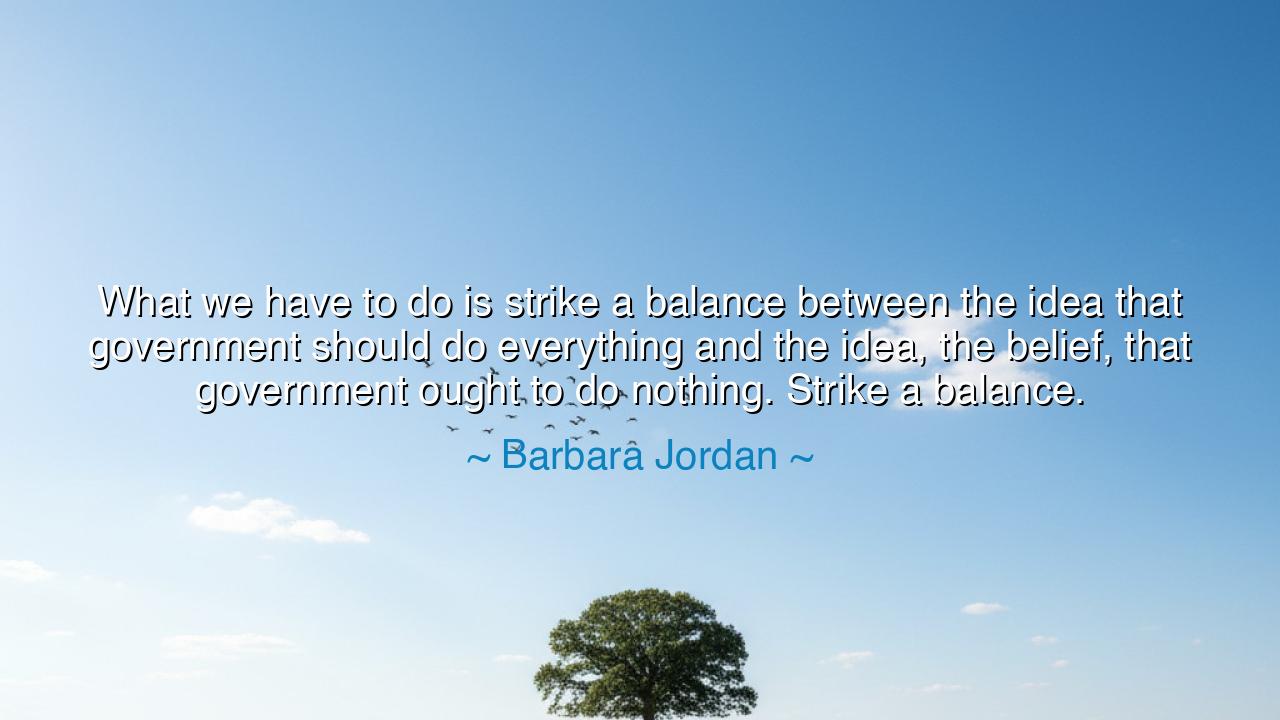
What we have to do is strike a balance between the idea that
What we have to do is strike a balance between the idea that government should do everything and the idea, the belief, that government ought to do nothing. Strike a balance.






“What we have to do is strike a balance between the idea that government should do everything and the idea, the belief, that government ought to do nothing. Strike a balance.” Thus spoke Barbara Jordan, a voice of justice and eloquence, whose words still echo through the halls of power and conscience. She saw, as few have seen, the eternal struggle between excess and neglect — between the government that smothers and the government that abandons. Her words, born in an age of discord, are no less a lesson for ours: that freedom cannot survive at the extremes, and that the art of governance, like the art of life, depends on the sacred virtue of balance.
In her wisdom, Jordan does not preach for the dominance of the state nor the wildness of unbridled liberty. She calls instead for harmony — that delicate point between chaos and control. A nation cannot endure if its people expect the government to do everything, for that path leads to dependence and decay of spirit. Yet neither can a society survive if it believes that government ought to do nothing, for that road leads to cruelty and neglect, where the weak perish and justice withers. The middle way — the balance — is the golden measure upon which the republic must rest.
The ancients spoke of this same principle. Aristotle called it the “mean,” the place between excess and deficiency where virtue thrives. And indeed, history has shown again and again that civilizations crumble when they forsake balance. In the age of Rome, the republic perished when citizens demanded too much from the state — free grain, free spectacle, free survival — until their liberty became a memory. Yet in later centuries, nations that abandoned their poor to the mercy of markets and monarchs also fell to ruin, their people rising in fury against the coldness of neglect. In both extremes, imbalance destroyed freedom.
Consider, then, the story of Franklin D. Roosevelt, who rose to lead America in the depths of despair during the Great Depression. The people cried out for help as banks failed, farms died, and breadlines stretched across the land. Roosevelt did not abolish the market, nor did he leave the suffering to fend for themselves. He sought, instead, the balance that Barbara Jordan would one day speak of — a government strong enough to protect, yet wise enough to permit freedom’s flow. Through the New Deal, he restored not only the economy but the faith of a nation. And when war came, the same spirit of shared responsibility guided the country to victory. It was not blind power that saved them, but the measured hand of balance.
Barbara Jordan, herself a champion of law and justice, understood that the greatness of democracy lies not in its passion, but in its temperance. The shouting of factions — one crying “more government,” another “none at all” — threatens to tear the nation apart. Yet she reminds us that the truest strength lies in understanding both sides, in listening beyond pride and ideology. The balance she speaks of is not weakness; it is wisdom — the mark of a people mature enough to govern themselves. For to strike a balance is to seek harmony not only in policy, but in the human heart.
Still, the call to balance is not easy. It demands discipline, humility, and the courage to question our certainties. It is far simpler to rage at the other side than to understand it. Yet those who love their nation must rise above simplicity. They must learn to see the purpose in opposing truths — that freedom needs order, that compassion needs responsibility, that progress needs restraint. In this, the balance of government mirrors the balance within the soul: if either side dominates unchecked, both the person and the nation fall into ruin.
So, what lesson shall we draw from her words? That each citizen bears a share of the scales. If we demand too much, we weaken the spirit of self-reliance; if we demand too little, we betray the bonds of brotherhood. Each law we shape, each vote we cast, must seek that balance — the place where justice is firm but fair, and liberty is bold but kind. It is not the task of rulers alone, but of all who call themselves free.
Therefore, remember this teaching, O seeker of wisdom: a just nation walks on two feet — freedom and responsibility. If one outpaces the other, the body stumbles. Let your heart be neither hardened by pride nor softened by dependence. Walk the middle path with courage, humility, and care. For in the rhythm between too much and too little, the republic finds its breath, and in that breath lives the enduring promise of democracy. Strike the balance — and the nation shall stand.






AAdministratorAdministrator
Welcome, honored guests. Please leave a comment, we will respond soon